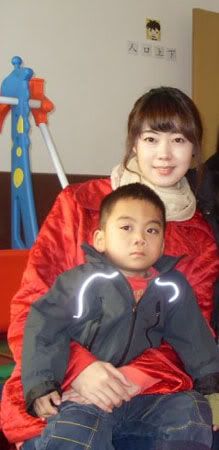
Liu Jia (center) visits Wenchuan. Photo: Courtesy of Liu Jia
By Elly Mui
Amid lavish soirees and dinner invitations from foreign tycoons, the rich in China have come a long way. The streets of China's major cities have seemingly transformed overnight with an explosion of Western luxury cars and burgeoning mansions; a drastic change from only a decade ago.
Chinese entrepreneurs have carved a crucial place for themselves within the society as staples for growth and power. These entrepreneurs are the foundation that helped bring China its international recognition.
And last month world-renowned entrepreneurs and philanthropists Bill Gates and Warren Buffet visited to encourage the spirit of giving. However, is China really ready for this kind of social change?
"Chinese people learn things very fast,"; Liu Jia, president and CEO of the massive Jiamei dental clinic chain said. Liu has just returned from Guangzhou where he will be opening yet another new dental clinic by the end of this year. He already owns hundreds all over China, and plans to go public on NASDAQ with an initial public offering set within the next two years.
Among his list of things-to-do are opening a major dental hospital in Beijing while also planning to buy out his competitors and opening Jiamei branches in the United States, specifically targeting the Chinese customers in Los Angeles. He is a busy man with no sign of stopping.
His office is filled with professional photographs of himself and elegant European-style furniture among a foray of awards and magazines that detail his successful career choices.
Despite a soft voice with gentle mannerisms, he has a taste for adventure. Liu's many talents include equestrian champion, extreme sports and seemingly any hobby worth a challenge.
One of few Yet, few know that he is also one of the few Chinese business owners who are engaging in philanthropy with his NGO Beijing non-profit organization aimed at providing medical and educational care for the needy.
"Now China's NGOs only have about 50 businessmen. Many Chinese businessmen have not joined NGOs because many don't understand them,"; said Liu, who believes that China's time to shine in the non-profit sector is about to come.
He is exactly the kind of person Gates and Buffet hoped to woo last month at their Giving Pledge banquet. But Liu did not attend the banquet, though he said he attended a pre-banquet meeting that he found to be very helpful.
Gorgeous face of an NGO
On a cold, rainy workday the head officer of NGO Beijing, Gao Yinghui, sits alone at the top of the Jing Xi Tower, the newly renovated and spacious headquarters for the NGO. She was Miss China Universe in 2006, and then met Liu two years ago when he was just conceiving the idea for NGO Beijing. At that time there were only five people in the organi-zation, though now Liu claims that there are "thousands."
However, the office is empty with Gao usually handling most of the business in the tower, waiting for the green light from Liu. A few months ago, the 2008 winner of the Miss China Universe competition, Wei Ziya, was hired to represent Liu's NGO Shanghai branch. These young women are among the many other female models and actresses who are the attractive public "faces" of Liu's NGO.
Gao doesn't do any direct marketing and said she simply believes that her friends and admirers will see her honorable charity work and also feel the need to join the organization.
A major problem for non-profits and NGOs in China is the difficulty in attaining legal status. Despite Liu's contributions, his NGO is still being "processed," a problem that many NGOs face in China.
Gao said she believes that the standard for meeting non-profit requirements are constantly changing. But without a firm legal status they face many issues.
However, Gao said she believes that one day the wealthy in China will surpass America's goodwill. As an example, she cited Chen Guangbiao, the multi-millionaire who has said he will leave his entire fortune to charity after he dies and has persuaded 100 of his peers to do the same.
Meanwhile, Liu said that China only needs two to 10 years to catch up to American's philanthropists.

Gao Yinghui, former Miss China, visits an orphanage in Beijing as the representative of NGO Beijing. Photo: Courtesy of Liu Jia
No tax incentivesYet there are many others who are not as optimistic. "Giving for giving's sake just doesn't fit into Chinese society," said Zhou Nailing, who teaches business journalism at Tsinghua University in Beijing.
She believes that China has given these entrepreneurs little incentive to hand over their wealth with no tax breaks compared to America's tax system.
She believes that the legal framework in America, such as the inheritance tax, encourages many of the wealthy to give to the poor instead of passing it on to their family, a tradition that is heavily taxed. Whereas donations to a charity not only allow for tax breaks but also refunds from the government. She sees that the current Chinese system encourages the wealthy to keep giving to their kin and lacks an attractive option to give to the less fortunate.
Greg Yang, an adjunct professor of company law at Peking University also noted that the struggle between the wealthy and the poor in China has lasted for such a long period of time that traditional values have diminished. He believes that many have turned away from having a "sympathetic heart" and instead invested in future fortunes. Yang also sees that many of the wealthy do not want to be burdened with extra problems that the government should fix. "The Chinese wealthy think that the government should be handling these issues," said Yang.
" The richest people in China are oligarchs," said Zhou, emphasizing that many of those who have the money are usually closely connected with the government.
One critic's view
A man surnamed Lee (who requested anonymity) and who has participated in multiple western operated charities within China, said that the most effective way to run an NGO within China is to work under the table.
He added that usually the wealthy are also less likely to give without generous publicity. "You do charity work not because you have the money, but because you have the heart," said Lee.
He said he believes that the entrepreneurs are just trying to gain publicity and asked, "If he or she had no recognition would they still want to give?"
He criticized the Gates and Buffet attempt as a weak way at showing China how to give because it sent a message that the dinner and giving was a "rich man's game" and added that government restrictions and control will make the efforts of entrepreneurs nearly impossible.
Despite this, Liu is one of the few entrepreneurs who are trying to make a charitable difference in China.
While his revenue for NGO Beijing mostly comes from himself, his partners and his family, last month the team went to Sichuan Province and gave 100,000 yuan ($15,000) for schools and hospitals to a farming village.
NGO Beijing and NGO Shanghai also hope to raise 3 million yuan for a Hope School in Guizhou Province by the end of this year. However, those who understand the struggles of NGOs in China believe that money and heart are not enough.
Official pull is important as well. Liu has long been well established within the government and was a representative for Dalian, Liaoning Province at the National People's Congress (NPC) in 1994.
He was also a policeman for many years. There is no doubt that many businessmen like him have been able to establish themselves through governmental relationships and that they have a greater impact on philanthropy issues due to their wealth and government connections.
Liu understands why ordinary people are not interested in donations. "[Ordinary] Chinese people have a hard time understanding what the government has done with their tax money or their donation," said Liu.
Zhou said that there are few businessmen who take on social responsibility and invest in non-profits because the culture doesn't exist in China.
The problem here is that there is little civil society," said Zhou, adding that the lack of social responsibility can't be cured overnight. She believes that asking for donations must be done tactfully, while the lack of social awareness may be a weak point in China's international image.
Even despite Liu's good intentions and high public profile he isn't able to give as much as he wants. Liu's revenue for NGO Beijing mostly comes from himself, his partners and his family.
"There are a lot of people in China who don't have money or work and there are too few NGOs to help them," said Liu.
Will charities be able to overcome their struggles or will the face of non-profits be just another Miss China Universe: a pretty face in a sea of overwhelming problems?
Click to read, The price of philanthropy in Global Times
